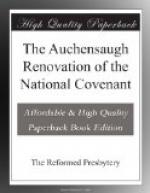Much uncleanness and filthiness, adultery, fornication, incest, bestiality, sodomy, lasciviousness, promiscuous dancing, stage plays, excessive drinking, vanity in apparel, and the like abominable unchastity and incentives to it. Much stealing, robbery and oppression, grinding the faces of the poor by unjust taxations and heavy impositions, and by hindering the poor from begging, for the support of their lives in times of scarcity, by a wicked edict. Perverting of justice in law suits; lawyers and advocates finding means, for their own gain and worldly advantage, to obtain decisive sentences in favor of the rich, contrary to justice and equity; much cheating and deceiving in bargaining; forestalling of markets in times of scarcity; depriving the poor of their habitations and livelihoods by building of parks and in-closures; tenants taking leases over their neighbor’s head, and the like. It is, moreover, to be bewailed that many ministers, who should be examples of charity and good works, are ringleaders in this sin of oppression. Much lying and bearing of false witness, defaming one another’s good name, reproaching persons for their adherence to the truths and cause of Christ, or for discovering any piece of zeal and affection that way. Much covetousness and worldly-mindedness, repining, murmuring and discontentment with God’s dispensations; revenge, wrath, malice, envy, bitterness and innumerable sins, both against the precepts of the moral law, and the offers of Christ in the Gospel, which plainly says that we have not used the endeavours which in this Article we promise, for “Rooting up profaneness and whatsoever is found contrary to sound doctrine and the power of godliness, lest we partake of other men’s sins, and so be in danger to receive of their plagues.” Nay, hath not much unsound doctrine been maintained in the arguments which have been used for defending the lawfulness of the courses of compliance with Prelacy and Erastianism? and these, amongst other unsound notions, have been entertained amongst us—“That lesser and circumstantial truths are not to be suffered for; that confession of these truths hath not been called for in our day; that people are not in hazard of the sins of others, especially of magistrates and ministers, if they do not directly act the same sins themselves; that sins of bypast times (if they be not presently practiced) are not to be confessed, nor the persons guilty to be stood at a distance from, till they give evident documents of their repentance;” contrary to express and plain Scripture.




